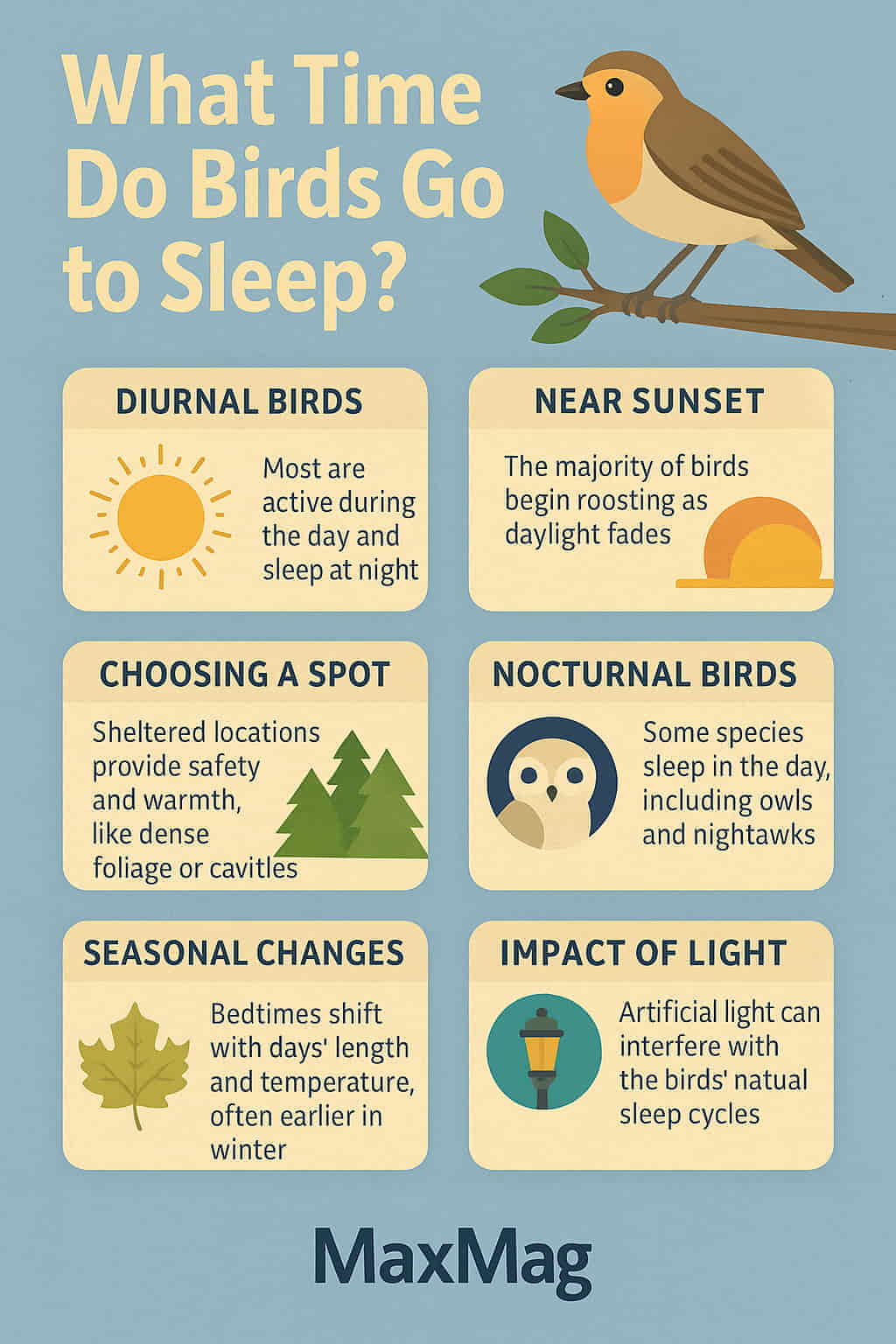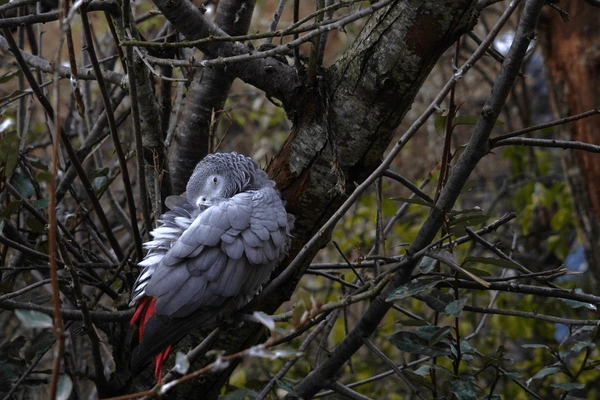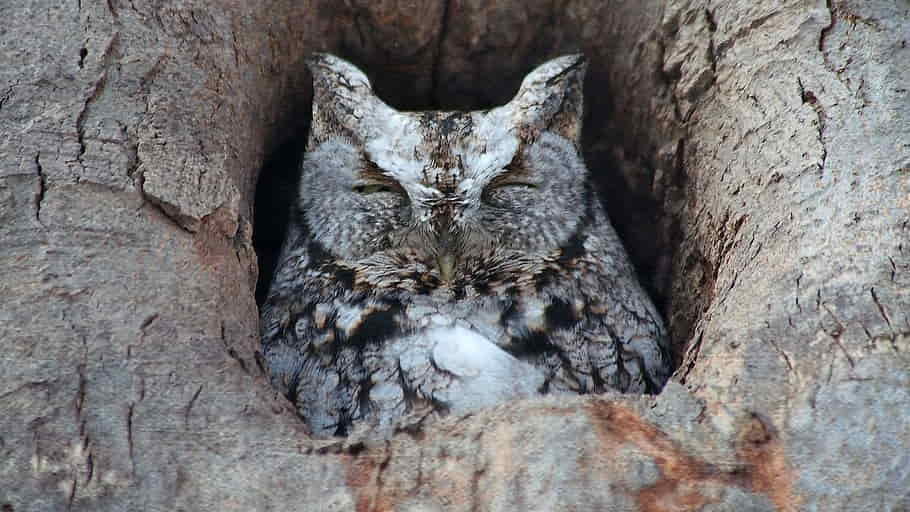
The question “what time do birds go to sleep” might seem simple, but the answer unlocks fascinating insights into animal biology, circadian rhythms, and environmental adaptation. Whether you’re a casual birdwatcher, a backyard feeder, or just a curious mind, understanding bird sleep patterns reveals how these creatures navigate the challenges of light, weather, and safety.
Birds, much like humans, rely on sleep for survival. But unlike us, their sleep schedules are heavily influenced by light levels, predator threats, and species-specific behaviors. So, what time do birds go to sleep? The short answer: most birds go to sleep at sunset, but with plenty of exceptions based on species, latitude, and season.
Let’s dive deeper into this topic, exploring how, when, and why birds sleep, and why understanding their bedtime is not just for ornithologists but also for anyone fascinated by nature.
Why Do Birds Sleep at Night?
Most birds are diurnal, meaning they are active during the day and rest at night. This cycle is dictated by their circadian rhythm, an internal biological clock synchronized with the rising and setting of the sun.
Light plays a crucial role:
-
Sunset triggers melatonin release, signaling to birds that it’s time to roost.
-
As the sun sets and visibility drops, feeding and foraging become difficult.
-
At night, predators like hawks and falcons—also diurnal—are less active, giving birds a safer window to rest.
This combination of environmental cues and evolutionary pressures is why the vast majority of bird species sleep during nighttime hours.
What Time Do Birds Go to Sleep Exactly?
The time birds go to sleep varies slightly depending on the season and geographical location, but in general:
-
Most small songbirds begin settling down 30 minutes before sunset
-
Larger birds like owls, herons, or geese may remain active longer
-
In equatorial regions (where day and night lengths are consistent), birds often maintain a routine bedtime around 6:00–7:00 PM
-
In northern latitudes during summer, birds may stay active until 9:00 PM or later due to extended daylight
In winter, you might notice birds disappearing by 4:30–5:00 PM, particularly in regions like the northern US or Canada. The lack of daylight shortens their active feeding time and prompts an earlier rest period.
Where Do Birds Sleep?
Birds don’t have bedrooms or nests they sleep in every night. Their sleeping spots are carefully chosen for safety and warmth:
-
Dense trees and bushes provide cover from wind and predators
-
Evergreen foliage offers better insulation in winter
-
Cavities in trees are popular among woodpeckers and nuthatches
-
Tall grasses or shrubs conceal ground-nesting birds
Interestingly, most birds do not sleep in their nests—those are primarily for raising young. Instead, they find hidden or elevated roosting spots where they can perch undisturbed.
How Do Birds Sleep Without Falling?
Birds have a unique locking tendon mechanism in their feet. When they perch on a branch and bend their legs, the tendons automatically tighten, locking their toes around the branch. This allows them to sleep standing up without falling.
Water birds, like ducks or geese, may sleep floating in the water. Others tuck into secluded areas along riverbanks or within reed beds, always prioritizing shelter and camouflage.
Do Birds Dream? Understanding Avian Sleep Cycles
Birds experience different sleep stages, including slow-wave sleep (SWS) and rapid eye movement (REM) sleep—just like humans. Studies using EEG (electroencephalogram) recordings have shown that birds:
-
Enter REM sleep in short bursts, often lasting just seconds
-
Can even sleep with one eye open, allowing one half of their brain to rest while the other remains alert
This “unihemispheric slow-wave sleep” is especially useful in high-risk environments, such as open water or during migration. For instance, swifts can sleep while gliding, resting parts of their brain mid-flight.
What Time Do Nocturnal Birds Go to Sleep?
Not all birds are diurnal. Some are nocturnal, meaning they sleep during the day and hunt at night. These include:
-
Owls
-
Nighthawks
-
Nightjars
-
Some species of herons and bitterns
These birds typically roost just before sunrise and wake up at dusk. They’ve evolved exceptional night vision, silent flight, and keen hearing to thrive in the dark. During daylight, they seek out hidden, shaded spots to rest undisturbed.
So when asking “what time do birds go to sleep,” remember it depends on whether you’re observing a day bird or a night bird.
Seasonal and Migratory Influences
Bird sleep patterns shift with the seasons:
-
During spring and summer, birds may stay up later for extended feeding hours and mating calls
-
Migratory species, such as warblers or shorebirds, may alter sleep entirely—some flying overnight and resting briefly by day
-
In Arctic regions, where daylight can last 24 hours, certain birds adjust by taking micro-naps or power rests rather than sleeping at a fixed time
This adaptability shows that while birds typically go to sleep around sunset, they can flex their schedule based on survival needs and environmental pressures.
How Weather Affects Bedtime
Weather plays a surprising role in avian sleep:
-
Storms or cold fronts may prompt birds to seek shelter earlier than usual
-
Overcast days can trigger early roosting behavior
-
Sudden drops in barometric pressure (which birds can sense) might prompt a change in behavior, including sleep
On cold nights, birds like chickadees or bluebirds huddle together to conserve warmth. Some species enter torpor, a state of reduced metabolic activity similar to deep sleep or mini-hibernation.
How Artificial Light Impacts Bird Sleep
In cities and suburban areas, artificial light pollution can confuse birds’ circadian rhythms, causing:
-
Delayed roosting
-
Increased nighttime activity
-
Disrupted sleep cycles
-
Higher exposure to predators and fatigue
A study by the Cornell Lab of Ornithology found that urban birds sing earlier in the morning and later at night than rural birds due to artificial lighting (source).
This disruption can interfere with mating, feeding, and navigation, especially for migratory birds that rely on stars and natural light cues.
How You Can Help Local Birds Sleep Better
To protect birds’ sleep and well-being in your backyard:
-
Turn off outdoor lights after sunset
-
Avoid disturbing roosting areas like dense trees or shrubs in the evening
-
Plant native foliage that offers safe roosting spots
-
Avoid using pesticides that drive away nocturnal insects—food for many birds
Simple changes to your yard or balcony can support healthier bird behavior and attract more visitors to your feeder.
FAQ: What Time Do Birds Go to Sleep?
Q1: Do all birds go to sleep at the same time?
No. Most birds follow the sunset, but bedtime varies by species, region, and season. Nocturnal birds like owls are active at night.
Q2: Do birds sleep in their nests?
Usually not. Birds only use nests to raise young. They sleep in dense foliage, branches, or cavities for protection.
Q3: How do birds sleep without falling?
They have a tendon-locking mechanism in their feet that allows them to perch securely even while asleep.
Q4: Can birds sleep while flying?
Yes—especially migratory species like swifts, which use unihemispheric sleep to rest mid-flight.
Q5: Do birds sleep longer in winter?
Yes. Shorter daylight hours and colder temperatures encourage earlier bedtimes and longer rest.
Conclusion: Respecting the Rhythm of the Skies
The next time you hear the last bird call at dusk or see a silent silhouette fly overhead, remember—birds follow a biological schedule finely tuned to the rhythms of Earth. Asking “what time do birds go to sleep” opens a window into the complex, adaptive world of avian behavior.
From seasonal shifts to city lights, birds balance survival and rest in ways that continue to inspire scientists and nature lovers alike. And in watching them, perhaps we can learn to respect the natural rhythms of our own lives too.



